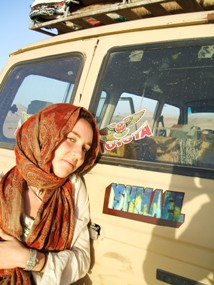Cairo, Egypt
Lara Calloway
Gallivanting
around Cairo, Egypt for a few days, I was
especially concerned about the way I was dressed. I’d been warned that
in the
predominantly Muslim country, bared shoulders, bellies, legs, or even
hair
would not only reflect poorly on my moral character, but attract all
sorts of
unwanted attention, specifically from the males. Watching women
covered-head-to-toe in black burkas and myself donning baggy
long-sleeves
shirts, loose pants, and a head scarf, I was still constantly paranoid
about
offending someone.
Imagine
my
surprise upon walking into a belly-dancing 'ahwa my last night in Cairo. I’d
certainly heard
about them, and I’ve certainly seen much more scandalous things in
nightclubs
in my own country, but after fretting about modesty the past few days,
I was
totally unprepared. The girl on the center stage was dressed in what
was
essentially a black bikini, covered by a sheer skirt, slit on both
sides all
the way to the waistband. She wore high heels and copious amounts of
makeup,
and her dance accentuated every exposed part of her body. Of course, I
expected
this, there’s nothing underground about this secret-seeming phenomenon.
Every
travel book, literature, and exposition I’ve ever read on Cairene
nightlife
culture mentions belly dancing. But knowing how seemingly unacceptable
this
kind of spectacle would be right outside of the 'ahwa’s closed doors
was
almost
unsettling. Comparable to a seedy strip joint back home on South Beach,
I couldn’t help but have so many questions about this practice.
The waitresses,
though not dressed quite as scantily as the dancers, were dressed in a
manner
inappropriate to wear outdoors, in spaghetti-string tank tops and
tight-fitting
jeans, and they unenthusiastically danced for the men whose tables they
tended.
Several times I’d turn around and watch the door, as if I was nervous
the
morality police were going to bust in and arrest everyone. I couldn’t
help but
wonder where these women go when the night is done, and what they wear
while
they walk home. What do their friends and family think, if they even
know, and
what are they like when they’re not dancing? In Tiantian Zheng’s
article Consumption, Body
Image, and Rural Apartheid
in Contemporary China,
he talks about how the rural migrant bar hostesses are very wary of
their own
security and cautious of releasing their identity and background
information. I
wonder if these Egyptian women are equally as protective, or if they
need to
be. Is the standard really as strict as
I’d been treating it all week long, and if so, where does this whole
underground, but-not-so-underground, trend fit in?

